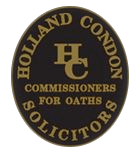6th April, 2020
The starting point for the valid signing of wills is found in The Succession Act 1965; one requirement of which is for the signing of the will to be made or acknowledged by the testator in the presence of two or more witnesses at the same time.
Nothing could be more contrary to the COVID-19 safety guidance, and so why, the question is asked, is there not a relaxation of these legal requirements in these exceptional times? The Succession Act does make special provision for those on active military action to make privileged wills, but this is specific, and cannot be extended to civilians without further legislation.
Do NOT panic. We can still assist you in making your will and there are ways that everyone can follow so a valid will is in place.
If someone is very ill, then they need to be assured that they can make valid and legal will that carries out what they want to happen on their death.
Here’s some advice we have received from the Irish Law Society :-
Where possible, instructions should be taken over the phone and the draft will be sent to the client by e-mail for approval and amendment before any decision is taken in relation to the execution of the will.
Obviously, some clients may not have e-mail or any internet access or a smartphone and taking instructions and advising over the phone.
The telephone will work well and the client needs to understand that they have to be fully satisfied with the will as this will be the version they will sign. No last minute codicils are advised.
If time is not of the essence, the draft will can be posted to the client for approval or amendment and posted back.
If it is not intended that the draft be executed by the client, this should be made clear to the client.
Attending at a client’s home
If you are travelling to the client’s home to execute the will, the following protocol is suggested: you and the witness may have to travel separately, or the client could organise a witness such as a neighbour to be there to witness the will along with yourself (assuming there is no charging clause in the will).
Writing surface
You should ask the client to have a desk or similar writing surface placed in front of a window, post the will through the letterbox, have the client execute the will, witnessed by you and the other witness through the window (if necessary the client can hold the will up to the window and sign it there) witnessed by you and the other witness.
You and the other witness can then sign the will in the visual presence of the testator.
Alternatively, if the client is sitting in their car when their solicitor arrives, they can sign on the dashboard of their car witnessed by a practitioner and the other witness.
The solicitor and the other witness can then sign on the bonnet of the car, at all times maintaining a social distance.
Separate envelope
Practitioners may consider keeping the will in a separate envelope for at least three days to reduce the possibility of viral transmission.
The drafting and execution of an affidavit of attesting witness should be attended to as soon as practicable after the execution of the will.
Costs should be agreed up front and paid to the practitioner on attendance or in advance.
There may be an additional travel charge.
Postal protocols
If it is agreed that the practitioner will post the will out to the client who will then organise their own two independent witnesses, the practitioner should advise the client that the witnesses need to see the testator sign their name; and that the witnesses can do this from a distance or, even, through a window, if this makes them feel more comfortable.
An A4 sized stamped addressed envelope may be considered for the client’s use, and the posting should be flagged.
The envelope should not be opened for a number of days after receipt.
If a client has broadband and wi-fi, it may be helpful if they were to ‘Skype’ or ‘Facetime’ an office while attending to the execution of the will.
Suggested instructions for execution of a will by post
1. Write ordinary signature (in biro) where indicated.
2. Each witness must then in the practitioner’s presence write his or her name, address and occupation.
3. It is vitally important not to choose witnesses who are going to benefit in any way under the will or who are married to or are civil partners of any beneficiary as this would render any gift null and void.
4. Insert the date in the space provided above the signature.
5. Do not staple the will to a covering letter and likewise do not attach a letter to the will with any paper clips.
All of these ‘do’s’ and ‘don’ts’ are vitally important if any will is to be admitted to probate unchallenged.
Any queries at all, no matter how minor or trivial they may seem, about signing a will, should be addressed to the practitioner, by telephone.




